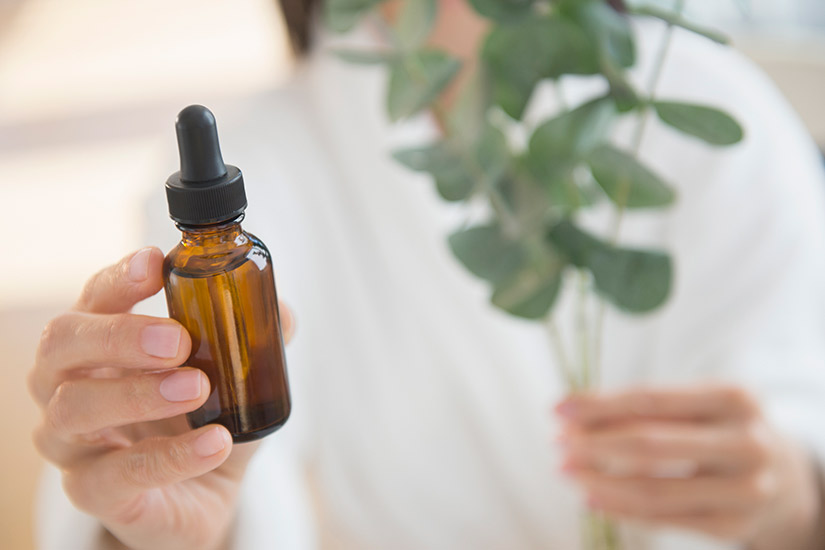Health & Fitness
What you need to know before buying essential oils
by : Katie Spreekmeester- Aug 3rd, 2016

They have been around forever. Thousands of years ago, Egyptians used essential oils to embalm their loved ones. According to the National Association for Holistic Aromatherapy, the name essential oil is actually a contraction of the term, “quintessential oils,” which stems from the Aristotelian belief that quintessence was the fifth element of matter.
They can be super powerful. Don’t be fooled by the term natural. Essential oils are still chemical compounds that have very powerful properties. “That’s why you should speak to a qualified aromatherapist or physician with a background in essential oils [before purchasing],” says Susanne Cutshall, a nurse with a certificate in aromatherapy who works at the Mayo Clinic in Minnesota. Typically, these oils are extracted from the flower or leaf of a plant and distilled into oil. Oils are easily absorbed, which is why they are so effective.
There are three primary ways to use essential oils. Aromatherapy is the inhalation of aromas in efforts to aid a specific problem, like nausea. Oils can be used in perfumery and on the skin. (Don’t ingest them, says Cutshall, as there is no proof they are safe to eat. You should also avoid essential oils when you’re pregnant.) If used on skin, essential oils must be diluted (with water or vegetable or nut oils) to a concentrations no higher than 5%, according to the Center for Spirituality and Healing at the University of Minnesota. Health Canada requires that oils be labelled based on what they will be used for. But always do your research first.
Not sure which oils to try? Go with these powerhouse options. Lavender oil is said to calm stress and anxiety, as well as act as a natural sleep aid. Put a few drops on your pillow or in your pre-bed bath, says certified holistic nutritionist Meghan Telpner. Another popular essential oil is peppermint oil because it’s been linked to helping digestion and nausea. (A 2014 University of California study found that this oil was superior to a placebo in treating irritable bowel syndrome symptoms.) More options below.

Ginger Do you know why your mom always gave you ginger ale for a stomachache? Because of the ginger, which reportedly helps with upset stomach and digestion when you inhale it or apply it topically. For patients suffering from nausea, Cutshall puts one to two drops of ginger essential oil on a cotton ball in a plastic baggy for them to waft under their nose. You can also try rubbing a few diluted drops on the bottoms of your feet, as this is reportedly a direct route to the blood stream.

Lemon and mandarin When 3 p.m. hits and you feel like you haven’t even made a dent in your to-do list (#everyday), lemon or mandarin essential oils may help. Like lavender oil, these have calming properties but they are also slightly energizing, which means you’ll feel less stressed but not like you’re going to fall asleep. Create a DIY mist by adding a few drops of oil into a spray bottle of water and misting it on your face or in the air.

Eucalyptus For those with asthma, mild respiratory issues, like chronic obstructive pulmonary disease, or even a yucky summer bug, eucalyptus oil may help decongest the nasal passage, lungs or sooth a sore throat. That’s why it’s found in many over-the-counter products such as rubs and vapour baths. Put one to two drops into a bath. You can also add some to your essential oils diffuser before you go to sleep.

Tea tree With its powerful antiseptic properties, tea tree oil is thought to both treat and prevent infection, which is why it’s so popular in anti-acne products. A word of warning: Tea tree oil can be drying to the skin if overused because it can cause the overproduction of oil on your face. It’s best to start off with a small amount, such as one drop at a 5% concentration either directly on the trouble area or combined with your cream or cleanser. Telpner also uses it around the house. “I’ll put a couple drops in the laundry when I’m washing towels or in cleaning water if I’m mopping the floor.”

Lemongrass Lemongrass essential oil will relax and uplift you all at once, which is why it is widely used in massage oils. Try it in a scrub by mixing coconut oil, honey, ginger and coconut sugar for your own at-home spa treatment, says Telpner.

Rose Looking for a room spray that’s chemical-free? Try rose essential oil. Its antiseptic properties help eliminate bacteria that cause odour. Make your own mist with a few drops combined with water in a spray bottle.
Newsletter
Join our mailing list for the latest and biggest in fashion trends, beauty, culture and celebrity.
Read Next

Fashion
H&M's Latest Designer Collab With Rokh Just Dropped (And It's So Good)
We chatted with the emerging designer about the collaboration, his favourite pieces and more.
by : Melissa Fejtek- Apr 18th, 2024

Culture
5 Toronto Restaurants to Celebrate Mother’s Day
Treat your mom right with a meal at any of these amazing restaurants.
by : Rebecca Gao- Apr 18th, 2024

Culture
ELLE Escapes: Savannah
Where to go, stay, eat and drink in “the Hostess City of the South.”
by : ELLE- Apr 15th, 2024


